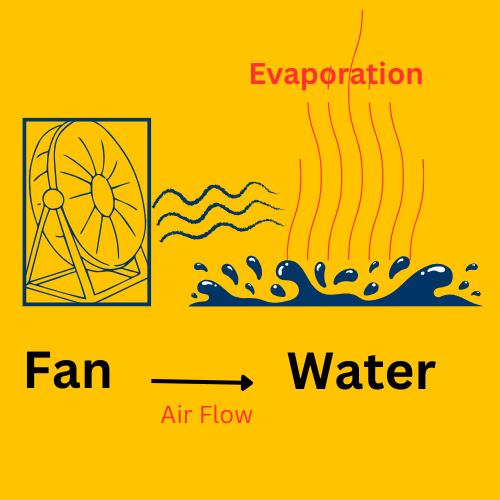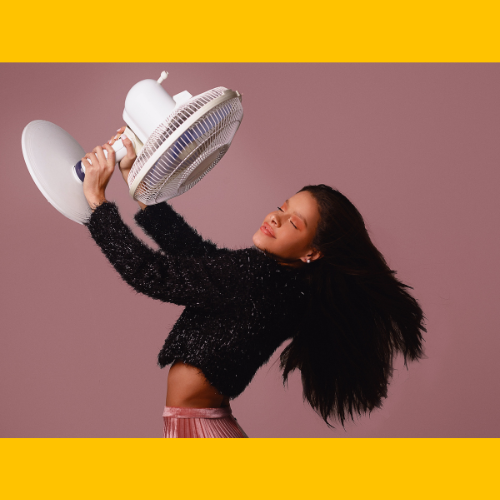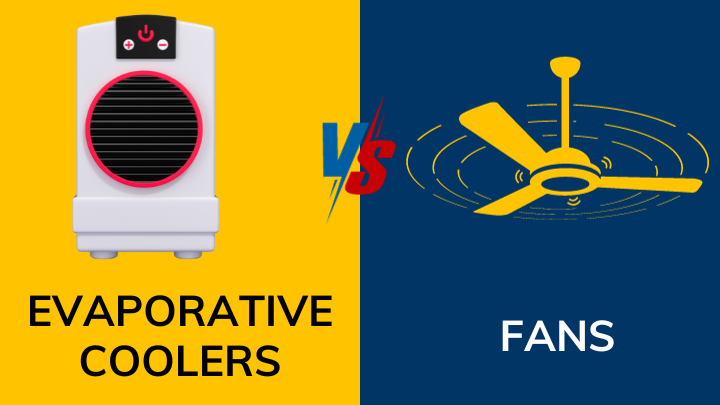Evaporative Cooler vs Fans: Introduction
Whenever you face scorching summer heat, and desperately searching for ways to cool down, “Air conditioners” might be the first thought that comes to mind, but as they come with their own set of drawbacks like high energy bills and environmental concerns.
This is where your thoughts may be shifting to “Evaporative cooler vs Fans” as more budget-friendly and often eco-conscious alternatives.
But with both options offering having it’ own benefits, choosing the right one can be confusing. Worry not, for this article will travel into the key differences between evaporative coolers and fans, helping you determine which one is the perfect match for your needs and preferences.
Evaporative Cooler vs Fans: Top Choices
Evaporative Cooler: Top Choices (on Amazon)
Here are top rated Evaporative Coolers to choose from:
No products found.
Fans: Top Choices (On Amazon)
Here are top rated Fans to choose from:
No products found.
Evaporative Cooler vs Fans: Comparison Showdown
How They Work?
The evaporative coolers, also known as swamp coolers, operate on a different principle. By using water and a fan, they cool the air by principle of evaporation. The normal air will be blown through water making it evaporate that in turn cools down the flowing air.

On the other hand, Fans which are more classic cooling companions simply circulate the existing air in a room, creating a wind chill effect that evaporates sweat from your skin, making you feel cooler. However, they don’t actually lower the air temperature itself.

Effectiveness in Cooling
- Evaporative Coolers: They can effectively cool the air by 10-15°F (5-8°C) in dry climates (humidity below 60%). In moderate humidity (60-70%), the cooling effect is still noticeable but slightly reduced. However, in very humid environments, evaporative coolers lose their effectiveness as the air is already saturated with moisture, hindering the evaporation process.
- Fans: While fans don’t lower the air temperature, they can make you feel up to 4°F (2°C) cooler through wind chill. However, this effect is localized and doesn’t cool the entire room, making them more suitable for personal cooling than large spaces.
Energy Consumption and Costing
- Evaporative Coolers: They use significantly less energy than air conditioners, running on a fraction of the electricity. This translates to lower operating costs, making them a budget-friendly option. However, they do require regular water refills and occasional maintenance like pad replacements, adding to the overall expense.
- Fans: They are the most energy-efficient cooling solution, consuming minimal electricity and keeping your running costs to a bare minimum. However, their limited cooling capacity and inability to cool large spaces might necessitate multiple fans, potentially negating the cost advantage.
Noise Level
- Evaporative Coolers: They can generate moderate noise, comparable to a small window fan. The noise level depends on the fan speed and model.
- Fans: Noise levels vary greatly depending on the type and size of the fan. Ceiling fans are generally quieter, while desk fans can be quite noisy, especially at higher speeds.
Environmental Impact
- Evaporative Coolers: They use water and electricity, making them a more environmentally friendly choice than air conditioners, which rely on refrigerants that can harm the ozone layer. However, water consumption and potential leaks need to be considered.
- Fans: They have the least environmental impact, using minimal electricity and producing no harmful emissions.
Mobility and Versatility
- Evaporative Coolers: They are usually portable, making them ideal for spot cooling or moving from room to room. However, some models might be bulky and require access to a water source.
- Fans: They offer the highest level of mobility, with portable and desktop options readily available. They are also versatile, cooling both indoors and outdoors.
Evaporative cooler vs Fans: Comparison Table
Here is a comparison table for ready reference for Evaporative coolers and Fans:
| S/n | Feature | Evaporative Coolers | Fans |
|---|---|---|---|
| 1 | Cooling Effect | Lower air temperature by up to 5°C in dry climates | Wind chill effect with no actual temperature reduction |
| 2 | Humidity | Increases humidity | No change in humidity |
| 3 | Effectiveness | More effective in dry climates (humidity < 50%) | Less effective in humid climates |
| 4 | Energy Efficiency | 70-80% less energy consumption than Air conditioners | Moderate energy consumption |
| 5 | Cost | More expensive than fans, but cheaper than air conditioners | Most affordable option |
| 6 | Maintenance | Regular cleaning and pad replacement needed | Minimal maintenance |
| 7 | Portability | Some models are portable | Generally portable |
| 8 | Best Suited for | Dry climates, outdoor spaces, cost-conscious individuals | Any climate, personal cooling, low maintenance needs |
Evaporative cooler Vs Fans: Which one to choose?
Choosing between the two really depends upon your personal needs and situation.
Who should choose Evaporative Cooler?
- Choose an evaporative cooler if:
- You live in a dry climate.
- You want to effectively cool a large room.
- You prioritize energy efficiency and environmental friendliness.
- You prefer portable cooling solutions.
Who should choose Fan?
- Choose a fan if:
- You are on a tight budget.
- You need immediate and localized cooling.
- You prefer minimal noise and maintenance.
- You value extreme portability and versatility.
Evaporative Cooler vs Fans: Conclusion
In the eternal battle of Evaporative Cooler vs. Fans, the right choice hinges on your specific needs and priorities. Evaporative coolers, with their cost-effectiveness and environmental friendliness, are perfect for dry climates. Fans, on the other hand, offer consistent air circulation suitable for all climates. Assess your budget, climate conditions, and maintenance preferences to make the cooling decision that aligns with your Indian home.
We trust this guide has provided you with valuable insights to make an informed choice. Feel free to comment and share your thoughts.
Also Read: Evaporative Coolers Buying Guide India 2024
Evaporative Cooler vs Fans: FAQs
Are fans noisy?
Fans, especially certain types like ceiling fans, can produce some noise, but it’s generally lower compared to air conditioners.
Can evaporative coolers work in humid climates?
Evaporative coolers perform best in dry climates, but advancements in technology make them effective even in moderately humid conditions.
Can Evaporative Coolers cause health issues?
Yes, An Evaporative cooler or Air cooler works by evaporating water particles in the air, so there is always a risk of increased humidity in the room and by breathing inn these humid water particles, one is at risk or catching cold or cough related problems.

